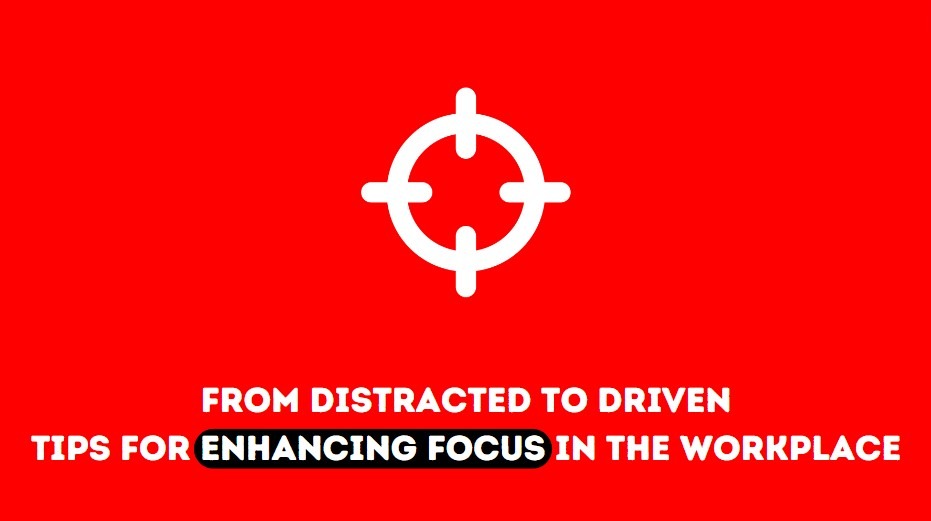Quick Summary
⭐ Acknowledge and Manage Distractions (Internal & External): Recognize both external distractions (tech, environment) and internal ones (wandering thoughts) and implement strategies like writing down intrusive thoughts, decluttering your workspace, and turning off notifications.
⭐ Implement Mindfulness, Time Management, and Mental Strategies: Practice mindfulness through breathing exercises, use techniques like the Pomodoro Technique, prioritize tasks, and visualize goals. Also, implement strategies like “stop trying to be focused and step away”, and single tasking.
⭐ Prioritize Lifestyle Factors for Enhanced Focus: Focus on a balanced lifestyle by ensuring adequate sleep, regular exercise, a healthy diet, and stress management. Also, be mindful of your social interactions at work, aiming for positive and energizing conversations.
So, you’re finding it hard to keep your mind on the job? You’re not alone. Distractions are everywhere. Emails ping, phones buzz, and let’s not even start on social media’s siren call.
But it’s not just tech. Our own minds can be our biggest distractors, wandering off when they should be on task. Recognizing these distractions is step one. Once you know your enemy, you can start to fight back.
Also, it’s not just about external factors; sometimes, our own internal dialogues can be just as distracting. You know what I’m talking about: that inner voice that won’t stop reminding you of other tasks or personal issues. It’s crucial to address these internal distractions by acknowledging them and finding ways to put them aside, at least temporarily. A good strategy? Write down these intrusive thoughts. It’s like telling your brain, “I’ve got this noted, now let’s focus.”
Creating a Distraction-Free Environment
Your environment matters. A lot. Take a look around your workspace. Is it a cluttered mess? If yes, it’s time for a clean-up. Physical clutter leads to mental clutter. Next, think about your digital environment. Those notifications that keep popping up? They’re focus killers. Consider turning them off during work hours. Remember, your workspace should be a sanctuary of productivity, not a battleground of distractions.
And don’t overlook the power of a personalized workspace. Sure, decluttering is great, but adding a personal touch – like a plant, a photo, or a motivational quote – can also enhance focus. These personal items can act as visual cues or anchors, reminding you subconsciously of your goals and why you’re there in the first place. Just remember, the key is balance; too many personal items can tip back into clutter territory.
Mindfulness and Mental Strategies
Mindfulness – it’s not just a buzzword. It’s a tool. Practicing mindfulness can anchor you in the present moment, keeping your focus sharp. Try simple breathing exercises or short meditative breaks. And don’t forget about cognitive exercises like puzzles or memory games. They’re not just fun; they train your brain to stay on task. Remember, a focused mind is a powerful tool.
Another strategy is just to stop forcing to focus.
If I’m feeling unfocused, “I simply stop trying to be focused and step away. Then I come back to the task when I’m ready.”
Steve Streit
Also, don’t underestimate the power of visualization. Visualizing your goals and the steps you need to take can be a potent mental exercise for maintaining focus. It’s like building a mental roadmap of where you need to go and what you need to do. This practice not only clarifies your tasks but also aligns your mental state with your work objectives, keeping you on a focused path.
Time Management and Productivity Techniques
Time management is like a secret weapon for focus. Heard of the Pomodoro Technique? It’s a game-changer. Work for 25 minutes, then take a five-minute break. It keeps your mind fresh and focused. And don’t forget to prioritize. Tackle the big, important tasks first. It’s about working smarter, not harder. Trust me, your focus will thank you.
And here’s another tip: limit multitasking. While it might feel productive, juggling too many tasks at once can actually scatter your focus. Instead, try single-tasking. Concentrate on one task at a time, and you’ll likely find your work quality and focus improving. This approach aligns well with time management techniques, allowing you to fully engage with each task, one at a time.
Lifestyle Factors Influencing Focus
Last but not least, let’s take a look at lifestyle. Yes, what you eat, how much you sleep, and how often you exercise can massively impact your focus. A balanced diet, regular exercise, and enough sleep can boost your concentration levels like nothing else. And don’t forget to manage that stress. A calm mind is a focused mind. Work-life balance isn’t just a trendy phrase; it’s essential for maintaining focus and avoiding burnout.
Another aspect to consider is your social interactions. Yes, the people you interact with at work can influence your focus. Engaging in positive, meaningful conversations can boost your mood and energy levels, thereby improving concentration. However, too much socializing, especially negative or gossip-filled chats, can drain your focus. It’s all about finding that sweet spot of social interaction that energizes rather than distracts.
So, there you have it. Regaining focus at work is about more than just willpower. It’s a combination of environment, techniques, and lifestyle. Try these tips, and watch your focus sharpen. You’ve got this!

